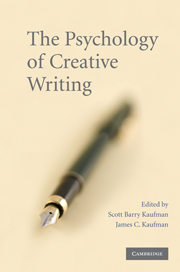Book contents
- Frontmatter
- Contents
- Contributors
- Foreword
- Preface
- Acknowledgments
- PART I THE WRITER
- 1 The Personalities of Creative Writers
- 2 The Creative Writer, Dysphoric Rumination, and Locus of Control
- 3 “The more I write, the better I write, and the better I feel about myself”: Mood Variability and Mood Regulation in Student Journalists and Creative Writers
- 4 Characteristics of Eminent Screenwriters: Who Are Those Guys?
- 5 The Tears of a Clown: Understanding Comedy Writers
- PART II THE TEXT
- PART III THE PROCESS
- PART IV THE DEVELOPMENT
- PART V THE EDUCATION
- Index
- References
3 - “The more I write, the better I write, and the better I feel about myself”: Mood Variability and Mood Regulation in Student Journalists and Creative Writers
Published online by Cambridge University Press: 25 January 2010
- Frontmatter
- Contents
- Contributors
- Foreword
- Preface
- Acknowledgments
- PART I THE WRITER
- 1 The Personalities of Creative Writers
- 2 The Creative Writer, Dysphoric Rumination, and Locus of Control
- 3 “The more I write, the better I write, and the better I feel about myself”: Mood Variability and Mood Regulation in Student Journalists and Creative Writers
- 4 Characteristics of Eminent Screenwriters: Who Are Those Guys?
- 5 The Tears of a Clown: Understanding Comedy Writers
- PART II THE TEXT
- PART III THE PROCESS
- PART IV THE DEVELOPMENT
- PART V THE EDUCATION
- Index
- References
Summary
In the movie The Hours, the writer Virginia Woolf is depicted as odd and volatile. In one scene she is prostrate, incapable of leaving her bed, and in the next she explodes in a flow of fiery and meaningless utterances. When Woolf announces to her husband that she has at last found the opening sentence to her novel Mrs. Dalloway, he hopes that writing will be what it has always been for her, a respite from her suffering. Unfortunately, this moment of peace is not to last, because manic-depression will eventually drive Woolf to suicide. This movie is one of many that crystallizes the view that there is a relationship between bipolar mood disorder and creative writing. This relationship does not only exist in the popular imagination but has also been demonstrated by numerous systematic studies. The purpose of this chapter is to explore this association by studying mood variability, rather than bipolar mood disorder, and by studying student writers rather than eminent ones. A second goal is to determine whether the act of writing improves mood in writers.
In this chapter, I first briefly outline the relationship between mood disorders and creative writing. I then review evidence for a relationship between subclinical mood variability and bipolar disorder, thus making it reasonable to explore a link between mood variability and creative writing. Finally, I review the effects of mood on creativity before focusing on the effects of writing on mood.
Information
- Type
- Chapter
- Information
- The Psychology of Creative Writing , pp. 41 - 56Publisher: Cambridge University PressPrint publication year: 2009
References
Accessibility standard: Unknown
Why this information is here
This section outlines the accessibility features of this content - including support for screen readers, full keyboard navigation and high-contrast display options. This may not be relevant for you.Accessibility Information
- 4
- Cited by
